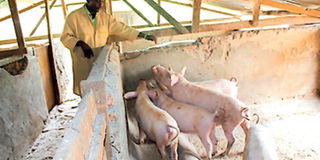Pigs teach former tutor lifetime lesson in wealth creation

Samuel Kimani in his pigsty in Trans Nzoia County. The former teacher quit teaching Kiswahili and history at Kapsara Secondary School in the county to venture into pig farming, where he says his heart was. PHOTO | GERALD BWISA | NMG
What you need to know:
- Today, the owner of Spring Farm in Matunda in Trans Nzoia does not regret his decision, having built a pig empire that has farrowed a hotel business.
- Kimani slaughters 30 to 50 pigs from his farm a month, with a kilo going for Sh300. On the other hand, he sells gilts from Sh25,000 to Sh35,000.
- Kimani says with pigs, he cannot do maize farming, the dominant crop in the region.
- Trans Nzoia County Agriculture executive Mary Nzomo notes that pig rearing offers massive opportunity for farmers in the region as maize growing faces several hurdles.
Some 12 years ago, Samuel Kimani quit teaching Kiswahili and history at Kapsara Secondary School in Trans Nzoia County to venture into pig farming, where he says his heart was.
Today, the owner of Spring Farm in Matunda in Trans Nzoia does not regret his decision, having built a pig empire that has farrowed a hotel business.
“I quit after serving for 17 years in search of greener pastures. I have no doubt I will remain a pig farmer for life, thanks to the good returns from this business,” says Mr Kimani.
His two-acre farm hosts over 300 animals kept in three huge sties with eight units each.
“Each pigsty measures 25 by 15ft and hosts some 100 animals of the Landrace and Large White breeds at different stages of growth,” says Mr Kimani.
He started with two sows that he bought at Sh35,000 each from Farmers Choice and built a sty to host them, with the venture gobbling up over Sh150,000 capital.
“I keep a maximum of 500 pigs which I rear to maturity and mainly supply to Springfarm Resort in Matunda and other outlets,” he says, adding that he owns the resort.
Kimani slaughters 30 to 50 pigs from his farm a month, with a kilo going for Sh300. On the other hand, he sells gilts from Sh25,000 to Sh35,000.
“I formulate my own feeds because commercial ones are expensive. I use maize, pellets, sweet potatoes silage and vegetables to make the feeds,” explains Kimani.
CLEANLINESS IS IMPORTANT
A 70kg bag of commercial feeds goes for Sh2,800, with Kimani saving Sh350 per bag by formulating his feeds. He has employed two workers and their work starts at 6am dairy, where they clean the pigsties and do the first feeding at 9am.
“The second feeding session is at 3pm, so generally we feed them twice in a day,” says Joseph Kehio, one of the farm workers.
He adds that cleanliness is important in pig rearing as it helps to keep diseases at bay.
“The stench on the farm also depends on the feeds one offers the animals and how waste is disposed of. Pigs are not dirty animals,” he notes.
Kimani says with pigs, he cannot do maize farming, the dominant crop in the region.
“Maize takes about eight months to mature but with pigs, profits start to come in after six months. Pigs litter after 113 days, we wean the piglets after 35 to 60 days. At about six months old, some of them are 50 or 60 kilos and that is best slaughtering time.”
Some of the challenges that Kimani faces include high cost of feed ingredients mainly the cereals and protein sources.
“In the next five years, I want to relocate the farm to another place because we have no space for expansion. Pig farming is very lucrative,” says Kimani.
Trans Nzoia County Agriculture executive Mary Nzomo notes that pig rearing offers massive opportunity for farmers in the region as maize growing faces several hurdles.
“Currently, our pig population is 7,000 and this is because pig rearing is not popular to farmers due to lack of market and reliance on maize,” she says.




